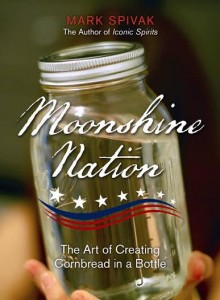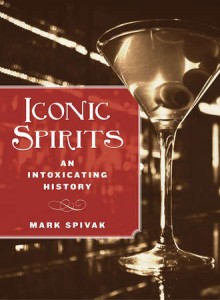Michael Hepworth
Moonshine Nation: The Art of Creating Cornbread in a Bottle
Making Book On Moonshine
HOLLYWOOD(Spiritsman)12/6/14/–Moonshine is one of the hottest cocktail ingredients in the US right now. The definitive book on moonshine has been released — Moonshine Nation: The Art of Creating Cornbread in a Bottle. The book gives the history of moonshine and profiles modern, legal moonshiners—amazing characters with stories to tell. Author Mark Spivak spent a year travelling through the backwoods of Kentucky, Tennessee and the Carolinas, learning things like without moonshine, there would be no NASCAR, and that women, in the early days of moonshine, were integrally involved in the business.
The definitive book on moonshine has just been released–Moonshine Nation: The Art of Creating Cornbread in a Bottle. Written by Mark Spivak and released by Lyons Press, the first half of the book traces the history of moonshine from the Whiskey Rebellion of 1791-94 through the present day. The second half profiles modern, legal moonshiners that Spivak met during the year he spent travelling through Kentucky, Tennessee and the Carolinas, doing research for the book. “Modern day moonshiners are amazing characters with compelling stories to tell,” Spivak said.The book also includes a collection of drink recipes from both old time and modern moonshiners.
Moonshine is corn whiskey, traditionally made in improvised stills throughout the Appalachian South. While quality varied from one producer to another, the whiskey had one thing in common: It was illegal because the distiller refused to pay taxes to the US government.
Many moonshiners were descendants of Scots-Irish immigrants who had fought in the original Whiskey Rebellion in the early 1790s. They brought their knowledge of distilling with them to America, along with a profound sense of independence and a refusal to submit to government authority. Today, many Southern states have relaxed their laws and now allow the legal production of moonshine—provided that taxes are paid. Yet many modern moonshiners retain deep links to their bootlegging heritage.
“Any resident of the Appalachian South will tell you that distilling corn whiskey was one of the few ways for farmers to scratch out a living and support their families. In fact, it was far more than that. Moonshine was a way to stand up to a system of law and government that many people thought was unfair. It was a way for the individual to score a fleeting but well-deserved victory over society,” Spivak said.
Highlights From Moonshine Nation
Without Moonshine, there would be no NASCAR
One chapter of the book explains why, without moonshine, there would be no NASCAR. Spivak interviewed North Carolinian Junior Johnson. Not only was Johnson a legendary bootlegger turned race car driver, but his life has come full circle: He’s now a partner with Piedmont Distillers in a line of legal moonshine calledMidnight Moon. The chapter on Junior Johnson (the man Tom Wolfe called The Last American Hero) is filled with Junior’s reminiscences about the birth of NASCAR and the legends he jousted with on the track, as well as a glimpse into the glory days of bootlegging in America—at his peak, Junior employed 75 people and ran tractor-trailers of moonshine back and forth from North Carolina to the Mississippi Delta.
The Long Tradition of Women Moonshiners
Spivak also found that female distillers are becoming less unusual in the 21st century, but they were commonplace in the Appalachian South. The wives and daughters of moonshiners had to know as much about the production of illegal corn whiskey as their husbands, since they were the ones who were forced to take over the business when their spouses or fathers went to prison. A typical moonshiner served three or four prison terms in his lifetime, and someone had to operate the still and support the family in his absence.
Spivak journeyed to Asheville, North Carolina to interview Troy Ball. The founder of Troy and Sons, Troy is America’s foremost female moonshiner (of the legal variety), and she is producing some of the purest and best corn whiskey on the planet, according to Spivak. Ball learned the craft slowly, studying for years with a collection of old-time moonshiners who had plied their trade at illicit stills. Her personal story is no less remarkable: As the mother of two special needs sons, non-verbal and confined to wheelchairs, she learned early on that persistence was the only road to success.
About Mark Spivak
Mark Spivak is an award-winning writer specializing in wine, spirits, food, restaurants and culinary travel. He was the wine writer for the Palm Beach Post from 1994-1999, and was honored by the Academy of Wine Communications for excellence in wine coverage “in a graceful and approachable style.” Since 2001 he has been the Wine and Spirits Editor for the Palm Beach Media Group, as well as the restaurant critic for Palm Beach Illustrated. His work has appeared in National Geographic Traveler, Robb Report, Art & Antiques, Men’s Journal, the Continental and Ritz-Carlton magazines, Arizona Highways and Newsmax. He is currently the host of Quench! a weekly podcast that reveals the untold stories behind everyone’s favorite alcoholic beverages, available on iTunes and at www.webtalkradio.net.
Mark is the author of Iconic Spirits: An Intoxicating History, published in November 2012 by Lyons Press (an imprint of Globe Pequot). In the book, he profiles the 12 spirits that changed the world and forged the cocktail culture. His second book, Moonshine Nation, chronicles the journey of America’s true native spirit—corn whiskey—from the Whiskey Rebellion to the present day.
Michael Hepworth
287 S.Robertson Blvd, Beverly Hills, CA 90211
http://twitter.com/MrSpiritsman
http://alquimie.com.au/publicatio





